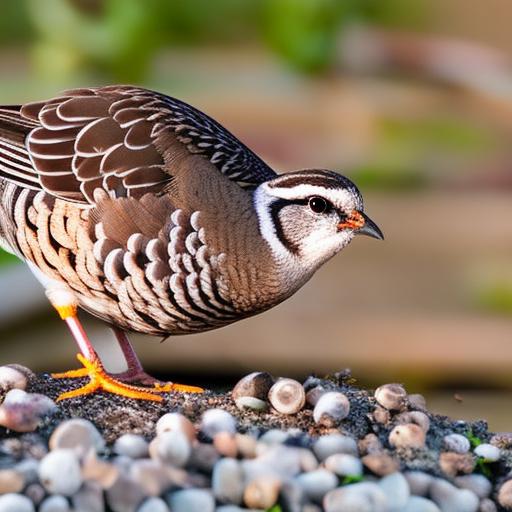City quail keeping is a rewarding and sustainable hobby that can be enjoyed by urban dwellers with limited space. Quails are small, low-maintenance birds that are well-suited for city living. They are relatively quiet, produce delicious eggs, and can be kept in a small outdoor or indoor space. Before embarking on city quail keeping, it’s important to understand the basics of quail care. Quails require a secure and predator-proof habitat, a balanced diet, and regular care to thrive in an urban environment.
Quails are social birds that thrive in small flocks, so it’s important to keep at least two or three birds to prevent loneliness and stress. They are ground-dwelling birds and require a habitat with plenty of space to roam and scratch. Additionally, quails need access to fresh water at all times and a balanced diet that includes a high-quality commercial feed supplemented with fresh greens and protein sources. City quail keepers should also be prepared to provide regular care, including cleaning the habitat, monitoring the birds’ health, and collecting eggs. With the right knowledge and preparation, city quail keeping can be a fulfilling and sustainable hobby for urban dwellers.
Key Takeaways
- City quail keeping is a rewarding hobby that can be done in small urban spaces.
- Consider breeds like Coturnix quail that are well-suited for urban environments.
- Utilize vertical space and DIY habitats to create a suitable living environment for quail in the city.
- Provide a balanced diet and regular care to ensure the health and well-being of city quail.
- Take measures to minimize noise and odor, such as using soundproofing and proper waste management.
Choosing the Right Quail Breed for Urban Environments
When it comes to city quail keeping, choosing the right breed is essential for success. There are several quail breeds that are well-suited for urban environments, each with its own unique characteristics and requirements. Japanese quail, also known as Coturnix quail, are one of the most popular breeds for city quail keeping. They are small, quiet, and prolific layers, making them an ideal choice for urban egg production. Coturnix quail come in a variety of colors and patterns, adding visual interest to a city quail habitat.
Another popular breed for city quail keeping is the Bobwhite quail. Bobwhite quail are native to North America and are known for their distinctive call and attractive plumage. While they may not be as prolific layers as Coturnix quail, Bobwhite quail are well-suited for urban environments due to their adaptability and hardiness. Other quail breeds that may be suitable for city quail keeping include California quail, Gambel’s quail, and Valley quail. When choosing a quail breed for urban environments, it’s important to consider factors such as noise level, egg production, and space requirements to ensure a successful and enjoyable experience.
Setting Up a Quail Habitat in a Small Space
Creating a suitable habitat for city quail keeping in a small space requires careful planning and consideration of the birds’ needs. Quails are ground-dwelling birds that require a secure and predator-proof habitat with plenty of space to roam and scratch. For urban quail keepers with limited outdoor space, a small coop or aviary can be constructed using lightweight materials such as wood or PVC pipe. The habitat should be well-ventilated and provide protection from the elements, including rain, wind, and extreme temperatures.
Inside the habitat, it’s important to provide a comfortable and clean living environment for the quails. This includes adding soft bedding material such as straw or wood shavings, as well as perches and hiding spots for the birds to feel secure. Additionally, the habitat should include areas for dust bathing, which is essential for maintaining the birds’ plumage and overall health. For urban quail keepers with limited outdoor space, indoor habitats can also be created using large cages or enclosures. These indoor habitats should be well-ventilated and provide ample space for the birds to move around and engage in natural behaviors. With careful planning and consideration of the birds’ needs, city quail keepers can create a suitable habitat for their feathered friends in a small space.
Feeding and Caring for Quail in the City
Feeding and caring for quails in the city requires attention to their dietary needs and regular maintenance of their habitat. Quails require a balanced diet that includes a high-quality commercial feed formulated specifically for game birds or poultry. This feed should be supplemented with fresh greens such as lettuce, spinach, and kale, as well as protein sources like mealworms or crickets. Additionally, providing access to grit or crushed oyster shells is essential for aiding in digestion and ensuring strong eggshells.
In addition to their dietary needs, quails require regular care to ensure their health and well-being. This includes monitoring the birds for signs of illness or injury, cleaning their habitat regularly to prevent the buildup of waste and bacteria, and providing fresh water at all times. Quails are relatively low-maintenance birds, but they still require attention and care from their keepers to thrive in an urban environment. By providing a balanced diet and regular care, city quail keepers can ensure the health and happiness of their feathered friends.
Dealing with Noise and Odor Concerns
One of the primary concerns for city quail keepers is managing noise and odor associated with keeping quails in an urban environment. While quails are generally quiet birds, they do produce some noise, particularly during the breeding season when males may call out to attract mates. To minimize noise concerns, city quail keepers can consider keeping only female quails or selecting breeds known for their quiet nature, such as Coturnix quail. Additionally, providing a well-insulated habitat can help reduce noise transmission to neighboring properties.
In terms of odor management, regular cleaning of the quail habitat is essential for minimizing unpleasant smells associated with bird waste. This includes removing soiled bedding material, cleaning food and water dishes, and maintaining good ventilation in the habitat. Using absorbent bedding material such as straw or wood shavings can also help reduce odors by absorbing moisture and waste. City quail keepers should also be mindful of local regulations regarding odor control and take proactive measures to ensure that their quail keeping practices are respectful of their neighbors.
City Quail Regulations and Legal Considerations

Before embarking on city quail keeping, it’s important for urban dwellers to familiarize themselves with local regulations and legal considerations related to keeping quails in an urban environment. Many cities have specific ordinances governing the keeping of poultry within city limits, including regulations related to noise, odor, habitat size, and proximity to neighboring properties. It’s important for city quail keepers to research these regulations and ensure that they are in compliance with local laws before establishing a quail habitat.
In addition to local regulations, city quail keepers should also consider any homeowners’ association rules or lease agreements that may impact their ability to keep quails on their property. Some homeowners’ associations may have restrictions on keeping poultry or specific guidelines related to habitat construction and maintenance. By understanding and adhering to these regulations and legal considerations, city quail keepers can ensure that their hobby is both enjoyable and respectful of their community.
Connecting with the City Quail Keeping Community
City quail keeping can be an enriching experience, but it can also be isolating without a community of like-minded individuals to connect with. Fortunately, there are many ways for city quail keepers to connect with others who share their passion for raising these delightful birds. Local poultry or homesteading groups may offer opportunities to meet other urban quail keepers, share knowledge and experiences, and even organize coop tours or egg swaps.
In addition to local groups, online forums and social media platforms provide a wealth of resources for city quail keepers to connect with others around the world. These platforms offer opportunities to ask questions, seek advice, share photos of their quails, and learn from the experiences of more seasoned keepers. By connecting with the city quail keeping community, urban dwellers can find support, inspiration, and camaraderie as they embark on this rewarding hobby in an urban environment.
In conclusion, city quail keeping is a rewarding hobby that can be enjoyed by urban dwellers with limited space. By understanding the basics of quail care, choosing the right breed for urban environments, creating a suitable habitat in a small space, providing proper feeding and care, managing noise and odor concerns, adhering to city regulations and legal considerations, and connecting with the city quail keeping community, urban dwellers can successfully raise these delightful birds in an urban environment while respecting their neighbors and community. With careful planning and consideration of the birds’ needs, city quail keeping can be a fulfilling and sustainable hobby for urban dwellers.
If you’re interested in city quail keeping, you might also want to check out Poultry Wizard’s article on “How Many Chickens Do You Need for a Family of 4?” This insightful piece provides valuable information on determining the right number of chickens for your family’s egg needs. It’s a great resource for anyone considering urban poultry keeping. (source)
FAQs
What is city quail keeping?
City quail keeping refers to the practice of raising quail in urban or city environments. This can be done in small spaces such as balconies, rooftops, or backyard gardens.
What are the benefits of city quail keeping?
City quail keeping allows urban dwellers to have access to fresh eggs and meat. Quail are also relatively low maintenance and can be raised in small spaces, making them a suitable option for city living.
What do city quails eat?
City quails can be fed a diet of commercial quail feed, as well as kitchen scraps and greens. It’s important to provide them with a balanced diet to ensure their health and productivity.
What are the housing requirements for city quails?
City quails can be housed in small coops or cages, as long as they have enough space to move around and access to fresh air and sunlight. It’s important to provide them with a clean and secure environment to protect them from predators and the elements.
Are there any regulations or restrictions for keeping quails in the city?
It’s important to check with local authorities and city ordinances to ensure that keeping quails is allowed in your area. Some cities may have restrictions on the number of quails that can be kept, as well as specific guidelines for housing and care.
Meet Walter, the feathered-friend fanatic of Florida! Nestled in the sunshine state, Walter struts through life with his feathered companions, clucking his way to happiness. With a coop that’s fancier than a five-star hotel, he’s the Don Juan of the chicken world. When he’s not teaching his hens to do the cha-cha, you’ll find him in a heated debate with his prized rooster, Sir Clucks-a-Lot. Walter’s poultry passion is no yolk; he’s the sunny-side-up guy you never knew you needed in your flock of friends!







